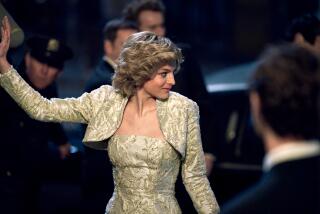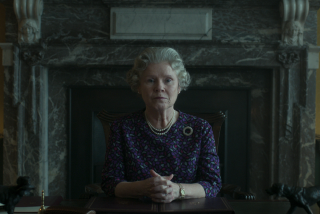A ‘Cuddly-Feely’ Britain Arises
- Share via
LONDON — The royal family may have been the last to find out, but it is a new Britain that spilled weeping into the streets last week.
“England just doesn’t seem very English. It’s gone all cuddly-feely,” John Cassidy, a writer at the New Yorker, wrote in the Sunday Times after days of emotional, candle-lit, flower-strewn mourning for Diana, princess of Wales.
Young, old, black, white, rich and poor, the millions of people who took Diana, killed in a car crash last week, as their icon have forgotten the old ideals of stoicism and class-based deference that used to symbolize Britain--and that still symbolize the ruling House of Windsor.
These new Britons shocked the royals, and their tiny circle of courtiers in double-breasted suits, with a torrent of open love and grief for the woman rejected as a wife by the Windsor heir, Prince Charles--then shocked them again by demanding that Britain’s royal rulers also make a public display of emotion.
Shocked, though still silent, the royals did their best to obey. Diana’s funeral, broadcast on giant screens in London parks and on televisions all over the world, was a creative mixture of high royal ceremonial and the pop songs, warmth and outreach of the new era that the royals hadn’t seen coming.
Last week was the first time that the people of Britain had acted not as “servile subjects” but as mature citizens, the Observer newspaper wrote, “and demanded that the monarchy bend its knee to a sovereign people.”
“Ours is no longer a deferential society, hidebound by outmoded notions of queen and country. Yes, there are great social divisions, but they are not between a cloth-capped populace and a top-hatted elite,” Cassidy said. “Diana didn’t create these changes--like all historical shifts, they are ultimately the product of great social and economic forces--but the manner of her death, and especially the initial reaction to her passing by the House of Windsor, has revealed how the tectonic plates have shifted for all to see.”
The Britain that Queen Elizabeth II rules today, more than 40 years after taking the throne, is a cheerful, experimental, inquisitive nation to which the empire and bowler hats of a generation ago are no more than legend.
They may be the children of a postwar generation scared of foreign food and terrified of garlic, but the multicultural people of modern Britain now eat Big Macs and mascarpone more readily than the roast beef of old England.
*
Pop music and film are boom industries. Quirky street fashion is matched by a growing number of up-market design houses. The high culture that was once the preserve of the privileged is now on offer to everyone; travelers in the London Underground subway system get a daily dose of instant uplift from posters carrying Britain’s best poetry.
A hip young mass culture has emerged from the pinstriped chrysalis. It draws its inspiration from modernity--television, technology and travel--rather than from the power of the past. As the old glass ceilings of accent and class melt away, relations between different cultural and ethnic groups have struck many American visitors to London this week as surprisingly friendly.
Britain’s class system was given its first thorough, if unintentional, shaking-up in the 1980s by the Conservative Party government of Prime Minister Margaret Thatcher. She promised Britain’s aspiring poor and middle class the perks traditionally enjoyed by the upper classes: houses, economic freedom and even stock portfolios.
For a few years of frenzied acquisitiveness, the attributes of poshness became street fashion--double-breasted suits, ape-the-rich pearl necklaces. Class divides were eroded, even if only because new-rich Brits began to imitate the clipped accents as well as the lifestyle of the aristocracy.
Then the tide turned, as Britain went into economic recession. Capitalism, 1980s style, struck the newcomers of the 1990s as harsh, greedy and selfish. Their revulsion against the dog-eat-dog rapaciousness of the Thatcher era swept easily across the class barriers that her neoconservatism had damaged.
Once economic recovery began, it was a revamped and centrist Labor Party--which espoused the newly popular virtues of caring and sharing, personal achievement not pedigree, and a more egalitarian and carefree society--that won a landslide victory in elections this May and completed the turnaround.
Diana’s quest for self-respect and for love since she separated from Charles, her trips to gyms and mystics and spiritualists, made her the goddess of this nationwide search for inner fulfillment.
Her high-profile embrace of AIDS patients, land mine victims, lepers, orphans and innocents--the people her brother, Charles Spencer, called “the constituency of the rejected”--paralleled a more general shift in Britain from a culture of exclusivity to one of acceptance, from a country whose motto was the sniffy “That’s simply not done” to one more likely to ask “Why not?”
“Why not?” was a question on many lips last week, during what British newspapers have nicknamed the Floral Revolution, as a nation searched its collective soul to find a way of honoring Diana’s passing.
Wondering whether she liked the idea of Elton John singing a rewritten “Candle in the Wind” at Diana’s funeral, journalist Barbara Ellen wrote in the Observer that, at first, “A pop song at a royal funeral seemed about as appropriate as receiving Holy Communion in a nightclub toilet. However, the more I thought about it, the more I thought, ‘Why not.’ ”
The funeral provided many more examples of acceptance.
One small group of mourners watching Diana’s coffin pass through London on Saturday followed it down the street until being stopped by a crowd-control barrier. Two women in the group--one white and middle class, one black and working class--told nearby police to move the barrier. After delay and hesitation, the police finally agreed and let them pass on.
“Yeah! People power!” enthused the black woman, in tough London Cockney. In the cut-glass tones of the shires, the white woman offered heartfelt agreement. “AB-so-LUTE-ly!” she echoed happily. They walked on together.
New Prime Minister Tony Blair, high priest of this society, mediated between queen and commoners last week in the search for compromise over how to mourn Diana. His efforts have been praised as a sign of hope for the royals in their future attempts to read the mood of the people they rule.
“It may be that the prime minister, who has demonstrated such unerring demotic instincts and who conferred with the prince [Charles] last week over the developing funeral arrangements, may yet guide the monarchy toward the kind of public presentation that chimes more surely with the public mood,” said liberal newspaper columnist Melanie Phillips.
More to Read
Sign up for Essential California
The most important California stories and recommendations in your inbox every morning.
You may occasionally receive promotional content from the Los Angeles Times.













